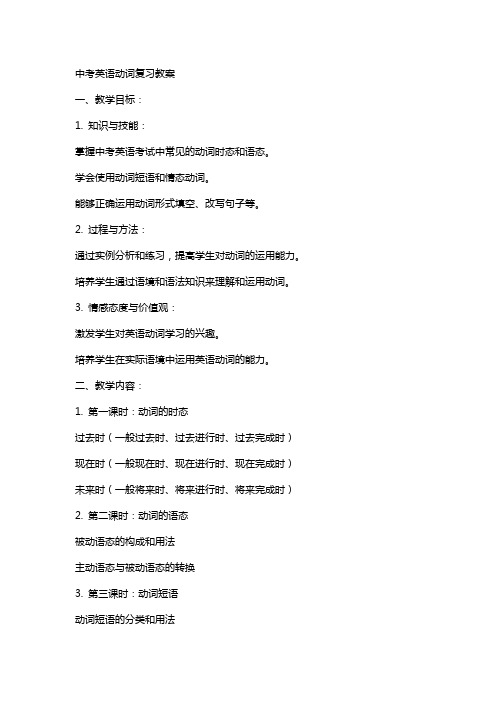中考复习之动词复习公开课
动词专项复习教案2024年人教版英语九年级中考

动词专项复习 教学设计【学习目标】1.复习和掌握动词的基本形式相关知识点。
2.复习和掌握情态动词的相关知识点。
3.复习和掌握实义动词、系动词和助动词的知识点。
4.通过习题巩固动词的用法 【核心任务】掌握动词的基本形式和动词的种类知识点并学会在习题中灵活运用。
【课时安排】本专题共三课时,第一课时完成段落一动词的基本形式之“知识回顾1”;第二课时完成段落二情态动词之“知识回顾2”,第三课时完成段落三实义动词、系动词和助动词之“知识回顾3”和段落四“即时练习”第 一 课 时【内容段落】段落一“知识回顾1”。
【侧重目标】 目标1。
【评价任务】完成“教师共学1”,评估目标1。
【学习过程】段落一 知识回顾〖师生共学1〗动词⎩⎪⎨⎪⎧动词的基本形式⎩⎪⎨⎪⎧动词的第三人称单数动词的现在分词动词的过去式和过去分词动词的种类⎩⎪⎨⎪⎧实义动词系动词助动词情态动词Ⅰ.动词的基本形式1.动词的第三人称单数变化3.动词的过去式及过去分词的构成go—went—gone do—did—donebegin—began—begun make—made—made第二课时【内容段落】段落二“知识回顾”。
【侧重目标】目标2。
【评价任务】完成“教师共学2”,评估目标2。
【学习过程】段落二知识回顾〖教师共学2〗情态动词情态动词表示说话人对某一动作或状态的态度,具有一定的感情色彩。
情态动词具有以下特点:(1)有一定词义;(2)不受主语人称和数的变化影响;(3)后跟动词原形一起构成谓语,不能单独充当谓语。
(1)can,could的用法①Can you (=Will you be able to) e this evening?你今晚能来吗?解读can表示具有某种能力,意为“能;会”,与be able to的意义基本相同。
但can只能用于一般现在时和一般过去时,而be able to却能用于各种时态。
②Can he still be alive after all this time?过了这么长时间,他还可能活着吗?解读表示可能性,意为“可能”。
2024中考九年级英语动词专题复习课件

母的动词,双写此辅音字母再加-ing
dig→digging plan→planning
少数以ie结尾的动词,变ie为y加-ing
die→dying, lie→lying
返回
目录
要点聚焦·精准导练
小试身手 用括号内所给词的适当形式完成语篇。
Jiang Shumei, born in 1937, 1. spent (spend) most of her time working in a factory. In 1996, she 2. learned (learn) her first Chinese character. Sixteen years later, she started to write down some of her own stories. It was not easy. Sometimes, 3. completing (complete)
返回 目录
要点聚焦·精准导练 命题点二 实义动词 知识必备 实义动词是能独立作谓语的动词,分为及物动词和不及 物动词。
返回 目录
要点聚焦·精准导练
类别 及物动词
用法
及物动词本身意义不完整,需要接宾语才能使其意义 完整。常用的三种句式结构如下: ·主语+谓语+宾语 ·主语+谓语+宾语+宾语补足语 ·主语+谓语+间接宾语+直接宾语
2024中考九年级英语 动词专题复习
返回 目录
要点聚焦·精准导练 命题点一 动词的基本形式 知识必备 动词有5种基本形式:动词原形、第三人称单数、过去式、 过去分词和现在分词。
返回 目录
形式 动词原形
第三人称单数
要点聚焦·精准导练
构成
示例
动词原形
be, do, have, come
动词专项复习(公开课)

Present continuous am/is/are + doing tense the moment, ed / Look! carry Listen! carried 直接加-ing ) playing (过去进行时 重读辅元辅,双写尾字母加 at -ed this play time last year, at that time, prefer preferred 以e 结尾去 e加 -ing Past continuous tense from …to was/were + doing take taking ... yesterday plan planned (注意: see--seeing) already, yet, just, three 不规则变化 (现在完成时 ) see saw times, ever, never, …, since… ago, over the 重读辅元辅,双写尾字母加 -ing for run running Present perfect tense buy bought have/has done past few years 特殊 lie lying
walk 选词填空。
wear
do
take
put on
feel exercise
A: What’s that youare _________ wearing around your stomach? B:It’s a new piece of technology that records how many steps you ______ walk each day. A:Why do you want to know? B:Because to keep fit, you need to walk at least 10,000 steps a day! It’s important ,both for a healthy to feel good. heart and for you ______ A:You are taking a sudden interest in exercise! have put on B:Yes.For the past couple of months,I ___________ a lot of weight. I should spend some time _________. exercising have never ______ taken ______ up A:but at least you _____ smoking. B: Yes,I’m really glad about that! Smoking is the do for your health. worst thing you can ______
中考英语动词的复习教案

中考英语动词复习教案一、教学目标:1. 知识与技能:掌握中考英语考试中常见的动词时态和语态。
学会使用动词短语和情态动词。
能够正确运用动词形式填空、改写句子等。
2. 过程与方法:通过实例分析和练习,提高学生对动词的运用能力。
培养学生通过语境和语法知识来理解和运用动词。
3. 情感态度与价值观:激发学生对英语动词学习的兴趣。
培养学生在实际语境中运用英语动词的能力。
二、教学内容:1. 第一课时:动词的时态过去时(一般过去时、过去进行时、过去完成时)现在时(一般现在时、现在进行时、现在完成时)未来时(一般将来时、将来进行时、将来完成时)2. 第二课时:动词的语态被动语态的构成和用法主动语态与被动语态的转换3. 第三课时:动词短语动词短语的分类和用法动词短语在句子中的位置和搭配4. 第四课时:情态动词情态动词的分类和用法情态动词在句子中的位置和搭配5. 第五课时:动词填空练习根据语境选择合适的动词形式填空改写句子,运用不同动词形式三、教学过程:1. 课堂讲解:通过PPT展示和讲解,让学生了解动词的时态、语态、短语和情态动词的用法。
通过实例分析,让学生理解不同动词形式在句子中的作用。
2. 课堂练习:针对每个知识点,设计相关的练习题,让学生在课堂上进行练习。
老师对学生的练习进行点评和指导,及时纠正错误。
3. 课后作业:布置相关的课后作业,巩固所学知识。
要求学生在课后进行自主学习,提高对动词的运用能力。
四、教学评价:1. 课堂表现:观察学生在课堂上的参与程度和表现,了解他们对动词知识的理解和运用能力。
2. 课后作业:对学生的课后作业进行批改,了解他们的学习效果和存在的问题。
3. 单元测试:在学习结束后,进行单元测试,评估学生对动词知识的掌握程度。
五、教学资源:1. PPT课件:制作精美的PPT课件,帮助学生直观地理解动词的知识。
2. 练习题库:设计丰富的练习题库,供课堂练习和课后作业使用。
3. 教学视频:寻找相关的教学视频,让学生更直观地了解动词的用法。
初三中考二轮复习语法专题动词态专项精选课件

初三中考二轮复习语法专题动词态专 项精选 课件
No
初三中考二轮复习语法专题动词态专 项精选 课件
3. 在含有when引导的时间状语从句中,从句一般用过去时, 主句用过去进行时。表示一个动作发生时,另一个动作正在进 行。在含有while引导的时间状语从句中,从句主句均用过去进行 时,表示动作在过去某一时刻同时进行。如: We were eating dinner in the kitchen when we heard the news on the radio.当我们在收音机上听到新闻时,我们正在厨房吃饭。 I was doing my homework while my sister was watching TV.当 我妹妹(姐姐)正在看电视的时候,我正在做家庭作业。
初三中考二轮复习语法专题动词态专 项精选 课件
No
初三中考二轮复习语法专题动词态专 项精选 课件
非延续性动词
延续性动词
非延续性动词 延续性动词
leave
be away
borrow
keep/have
buy
have
begin/start
be on
die
be dead
finish/end/stop be over
2. 主语+am/is/are going to +动词原形 (表示打算、计划、愿意 做某事,也可用来表示自然现象)
3. 主语+am/is/are+动词现在分词(常用于这种结构的动词有 come, go, leave, arrive, start, begin等,表示即将发生或安排好的要 做的事情。)
中考复习之动词复习公开课ppt课件

精选编辑ppt
6
6. ___the Blacks ___TV at seven yesterday?
A. Did; watch B. Are, watching C. Were; watching D. Do; watch
精选编辑ppt
1
动词种类
类别 行为动词 Action Verbs
意义
有意义,表示动作或状态,在句 中能独立作谓语。
系动词 Link Verbs
有词义,不能独立作谓语,必须 与表语一起构成谓语。
助 动 词 没有词义,不能独立作谓语,只能和主
Auxiliary Verbs
要动词一起构成谓语动词,表示否定、 疑问、时态或其他语法形式。
2. Before we got to the railway station, the train___ already. A. went out B. had gone C. has gone D. has arrived
3. The film ___ when I ___ to the cinema. A. has begun; get B. had begun; got C. has been on; get 精D选编.辑hppat d been on; got 13
Tom has had the new bike for several days.
It is/has been several days since Tom bought the new bike.
Several days has passed since Tom bought the new bike.
中考复习之动词复习公开课

was reading an interesting story in her
room.
A. was watching B. is watching
C. has watched D. had watched
9. We __ TV last night when we heard a cry.
A. were watching B. would watch
PPT课件
4
1. ___ he ___ a good time last Sunday? A. Were; were B. Did; do C. Did; has D. Did; have
2. When he was a child, he____ in the garden in the morning. A. always plays B. always played C. plays always D. played always
C. were building/Have…finished
D. built/Did…finish.
2. -_____ you _____ your lunch yet? -Yes, I have.
-When ____ you ____ it?
_ An hour ago.
A. Did..have/did…have B. Have…had/did have
PPT课件
9
1.-I hear the workers ____ a plateform for air performance yesterday.
-So do I. ______ they ______ it yet?
A. build/Do…finish B. building/are…finishing
感官动词中考英语语法专题复习(全国通用)公开课PPT(61张)

02
Her voice ______A_______ like my mother’s.
A.Sounds
B.sound
C.looks
D.look
【解析】考查感官动词的词义辨析,听起来,用sound,可接like+名词。her voice是不可 数名词,动词sound用三单形式+s.
跟踪练习
3.I often see her _______D______ in the park.
二 感官动词的用法
感官动词 中考英语语法专题复习(全国通用 )教学 PPT-(6 1页)-P PT执教 课件【 推荐】 感官动词 中考英语语法专题复习(全国通用 )教学 PPT-(6 1页)-P PT执教 课件【 推荐】
注意:
(1)连系动词不能单 独作谓语,其后必须 接形容词、名词或介 词短语作表语。 (2)含连系动词(be 除外)的句子变疑问 句时,一定要借助do, does,did。
中考考查重点
2.感官动 词的用法
感官动词 中考英语语法专题复习(全国通用 )教学 PPT-(6 1页)-P PT执教 课件【 推荐】
感官动词 中考英语语法专题复习(全国通用 )教学 PPT-(6 1页)-P PT执教 课件【 推荐】
第一部分 知识讲解
感官动词 中考英语语法专题复习(全国通用 )教学 PPT-(6 1页)-P PT执教 课件【 推荐】
to sing; singing
【解析】经常听见Jom唱歌,强调Jom唱歌的全过程,用hear sb.do sth。Listen!表示听见他正在唱歌, 用hear sb.doing sth.。
感官动词 中考英语语法专题复习(全国通用 )教学 PPT-(6 1页)-P PT执教 课件【 推荐】
- 1、下载文档前请自行甄别文档内容的完整性,平台不提供额外的编辑、内容补充、找答案等附加服务。
- 2、"仅部分预览"的文档,不可在线预览部分如存在完整性等问题,可反馈申请退款(可完整预览的文档不适用该条件!)。
- 3、如文档侵犯您的权益,请联系客服反馈,我们会尽快为您处理(人工客服工作时间:9:00-18:30)。
sinceห้องสมุดไป่ตู้ten years ago, since2000.
3. have been to / have gone to / have been in
Eg3: My father isn't here now. He ___Shanghai. He ___ there twice. A. has gone; has been B. has gone to; has been to C. has been to; has gone D. has gone to; has been
The workers were building a tall building last month. The workers built a tall building last month.
1.-I hear the workers ____ a plateform for air performance yesterday. -So do I. ______ they ______ it yet?
It is/has been 4 years since the old man died. Four years has passed since the old man died.
2. The meeting began 5 minutes ago.
The meeting has been on for 5 minutes. It is/has been 5 minutes since the meeting began. 5 minutes has passed since the meeting began.
3.-Will you watch the World Cup matches this year?
杭州市近4年中考单选题-时态题选: 1. She __ that same sing so many times. I’m getting sick of it! A. sings B. sang C. will sing D. has sung
2. Linda has ___ been to Disneyland, has she? A. never B. ever C. already D. even
4. Tom bought the new bike several days ago. Tom has had the new bike for several days. It is/has been several days since Tom bought the new bike.
Several days has passed since Tom bought the new bike.
P11一般过去时:1. 表示过去某个时间经常发生的 动作或状态.常和the day before yesterday, last month, two weeks ago, in 2008, after that等连用. 2.表示过去经常发生的动作. always, often, usually, once a week.
动词种类
类别 行为动词 Action Verbs 系动词 Link Verbs 助动词 Auxiliary Verbs 情态动词 Modal Verbs 意 义 有意义,表示动作或状态,在句 中能独立作谓语。 有词义,不能独立作谓语,必须 与表语一起构成谓语。 没有词义,不能独立作谓语,只能和主 要动词一起构成谓语动词,表示否定、 疑问、时态或其他语法形式。
非延续性动词
be up have a cold wear be married to
get to/ arrive/reach be in…
come here/go there be here/there
同义句转换
1. The old man died 4 years ago.
The old man has been dead for 4 years.
3. My uncle left Hangzhou a month ago.
My uncle has been away from Hangzhou for a month. It is/has been a month since my uncle left Hangzhou. A month has passed since my uncle left Hangzhou.
有意义,但不能独立作谓语,只能和主要动 词一起构成谓语动词,表示说话人的语气和 情态。情态动词没有人称和数的变化。
动词的形式:
原形 三单形式 现在分词 过去式 过去分词
study studies studying studied studied
stop
do
stops
stopping
stopped stopped
10. I ___ the floor when my father came in. A. was sweeping B. swept C. sweeping D. am sweeping
P13 过去进行时:was/were+V.ing. This time last night, at that time, from 7:00 to 9:00 yesterday morning, at eight yesterday evening, when/while等 从句连用。
already, yet, ever, never, just, recently.
2. 从过去一直延续到现在的动作,可能还要延续。 与for… /since…/ since+句子/so far, for a long time, 等连用. Eg 2: Judy has lived in Shanghai for ten years.
_ An hour ago.
A. Did..have/did…have B. Have…had/did have
P14 现在完成时: have/has+P.P 1. 过去的动作,现在的影响或结果。 Eg1: __ you __ the novel that I lent you last week? A. Did; finish B. Have; finished C. Are; finished D. Do; finish
现在完成时/过去完成时在与 for/since连用时的区别.
延续性动词与非延续性动词的相互转化
Eg: He joined the army two years ago.
He has been in the army for two years. He has been a soldier for two years.
4. He ____ at six, but now at five. A. used to get up B. used to getting up C. used get up D. was used to get up
5. He came in, ___ his coat and sat down. A. took down B. took off C. taking down D. taking off
does
doing
writing
did
wrote
done
written
write writes
listen, open, see.
动词的时态: 定义:不同时间发生的动作用不同的动词 形式表示,这种动词形式称为时态.“时 态”按动作发生时间可分为“过去,现在, 将来,过去将来”.按动词形式可分为 “一般,进行,完成,完成进行”
A. build/Do…finish B. building/are…finishing
C. were building/Have…finished
D. built/Did…finish.
2. -_____ you _____ your lunch yet? -Yes, I have.
-When ____ you ____ it? C. Do…have/have…had
非延续性动词
be away (from…)
be on be over be (keep) closed/open be dead be in+…/be a member of/be a…
延续性动词
fall ill get up catch a cold put on get married to be ill
He has been a member of the army for... It is/has been two years since he joined the army.
延续性动词
leave borrow buy begin/start finish close/open die join keep have
B. always played D. played always
3.–Sorry but your address again please. I__catch it. --It's 28 Zhongshan Road. A. didn't B. don't C. won't D. wouldn't
8. While Tom___ a football match, his sister was reading an interesting story in her room. A. was watching B. is watching C. has watched D. had watched 9. We __ TV last night when we heard a cry. A. were watching B. would watch C. watch D. watched
